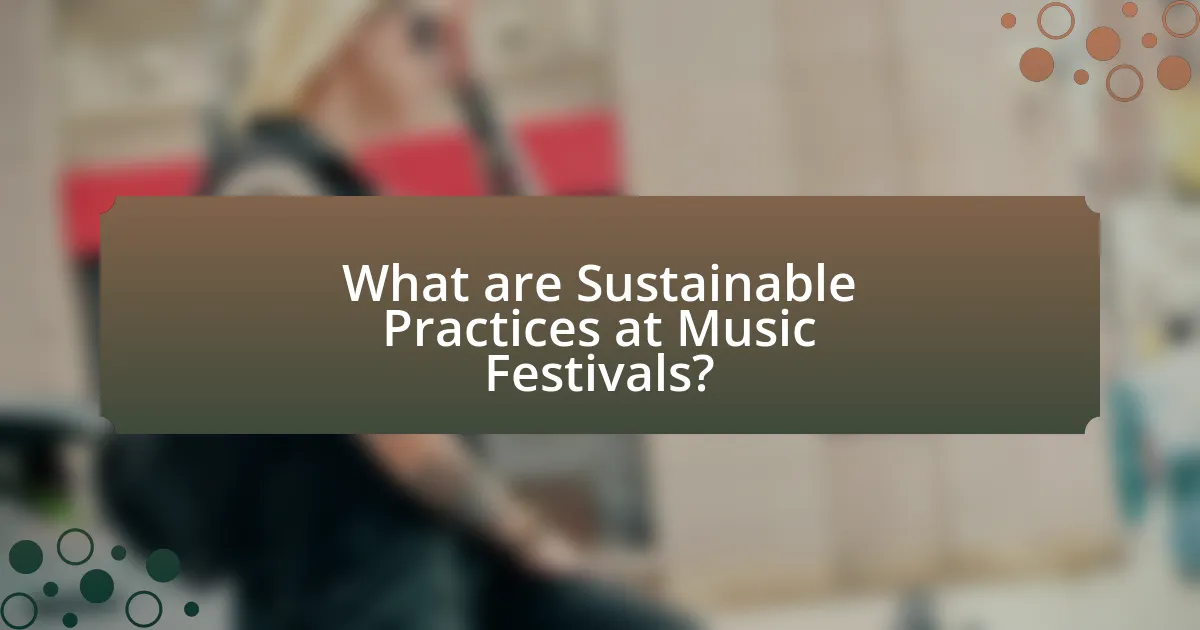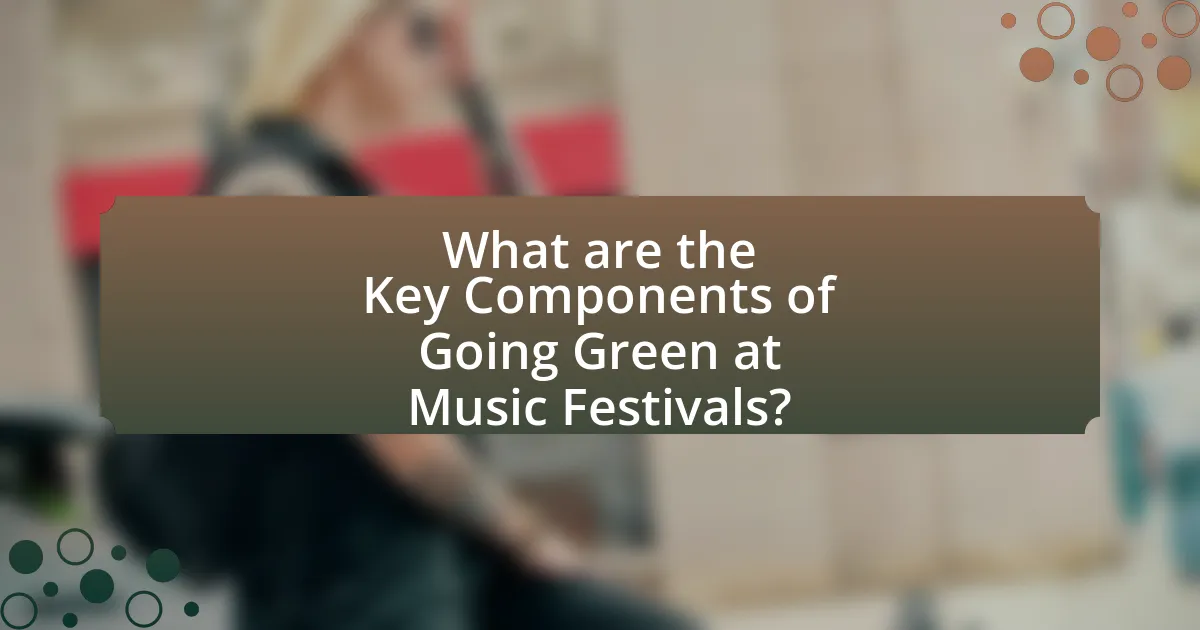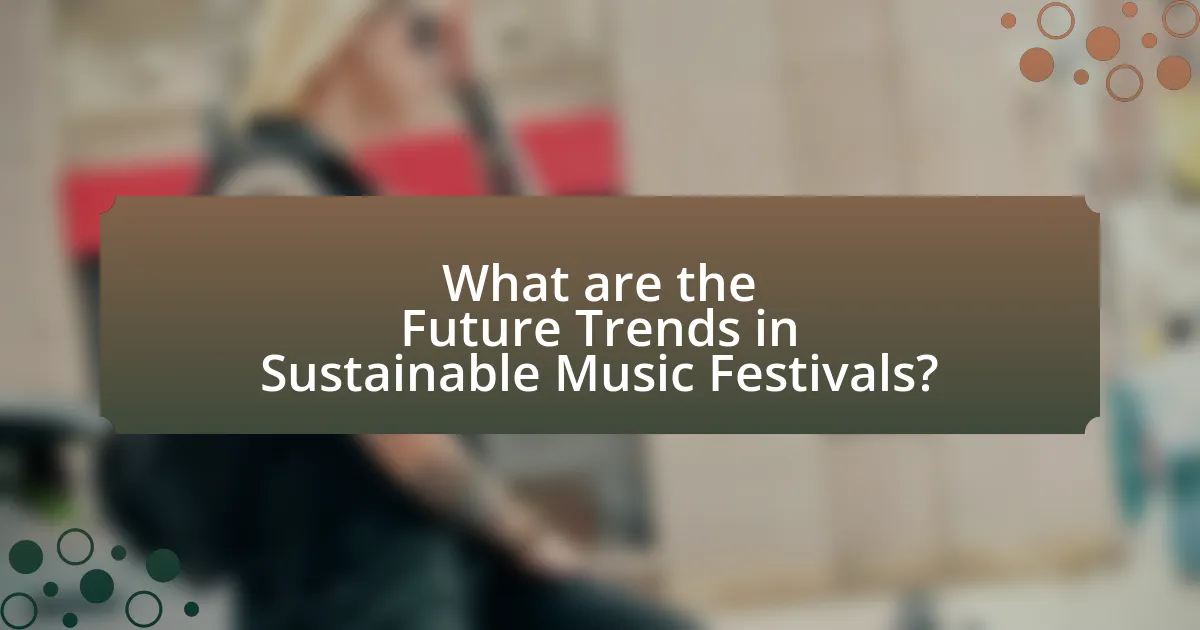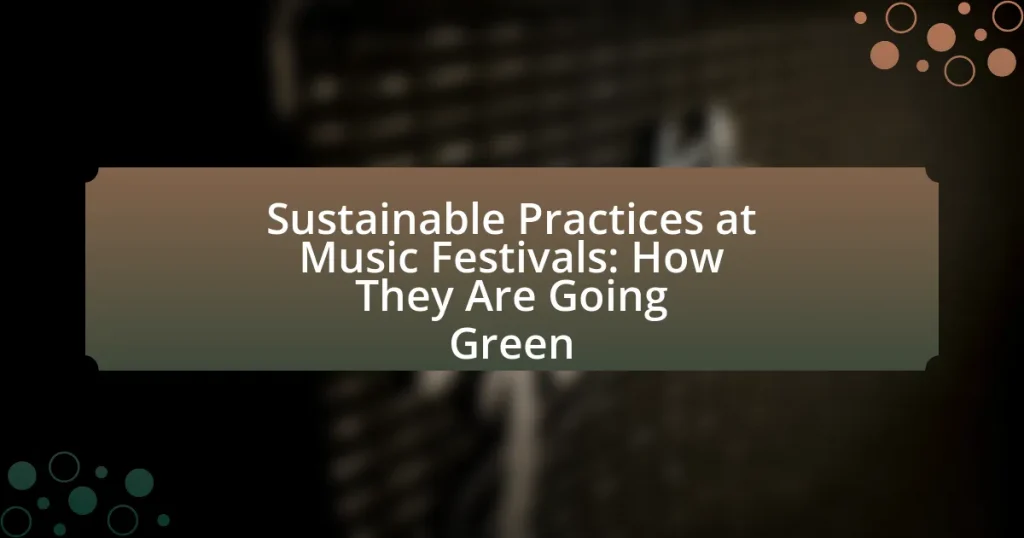Sustainable practices at music festivals encompass waste reduction, energy efficiency, and eco-friendly transportation methods. Festivals are increasingly adopting initiatives such as comprehensive recycling and composting programs, renewable energy sources like solar and wind power, and promoting sustainable transportation options to minimize their environmental impact. Key components of these efforts include effective waste management, local sourcing of food and materials, and the integration of technology for enhanced sustainability. The article explores the importance of these practices, the challenges faced, and future trends in the music festival industry, highlighting how sustainability not only benefits the environment but also enhances the overall festival experience for attendees.

What are Sustainable Practices at Music Festivals?
Sustainable practices at music festivals include waste reduction, energy efficiency, and eco-friendly transportation. Festivals implement recycling and composting programs to minimize landfill waste, with some events achieving over 90% waste diversion rates. Additionally, many festivals utilize renewable energy sources, such as solar and wind power, to reduce their carbon footprint. Eco-friendly transportation options, like shuttle services and bike parking, encourage attendees to use sustainable methods to reach the venue. These practices not only lessen environmental impact but also promote awareness and responsibility among festival-goers.
How are music festivals implementing sustainability initiatives?
Music festivals are implementing sustainability initiatives by adopting practices such as waste reduction, renewable energy usage, and eco-friendly transportation options. For instance, many festivals now utilize solar panels to power stages and facilities, significantly decreasing their carbon footprint. Additionally, festivals are increasingly promoting recycling and composting programs, with some reporting up to 80% waste diversion rates. Furthermore, initiatives like encouraging carpooling and providing shuttle services reduce the number of vehicles on the road, further minimizing environmental impact. These measures reflect a growing commitment within the music festival industry to promote sustainability and environmental responsibility.
What specific practices are being adopted for waste management?
Music festivals are adopting several specific practices for waste management, including comprehensive recycling programs, composting initiatives, and the use of biodegradable materials. These practices aim to minimize landfill waste and promote sustainability. For instance, festivals often provide clearly labeled recycling and compost bins to encourage attendees to dispose of waste properly, significantly increasing recycling rates. Additionally, some festivals partner with local organizations to ensure that organic waste is composted, which can reduce overall waste by up to 30%. The implementation of these practices reflects a growing commitment to environmental responsibility within the music festival industry.
How do festivals promote eco-friendly transportation options?
Festivals promote eco-friendly transportation options by implementing initiatives such as shuttle services, bike parking, and public transport partnerships. These measures encourage attendees to use sustainable modes of travel, reducing carbon emissions associated with personal vehicles. For example, many festivals collaborate with local transit authorities to provide discounted or free public transport to and from the event, which has been shown to significantly decrease the number of cars on the road. Additionally, festivals often offer incentives for attendees who arrive by bicycle, such as secure bike parking and rewards, further promoting environmentally friendly transportation choices.
Why is sustainability important for music festivals?
Sustainability is important for music festivals because it minimizes environmental impact and promotes social responsibility. Music festivals generate significant waste, with studies indicating that a single festival can produce over 1,000 tons of waste, including plastics and food waste. By implementing sustainable practices, such as waste reduction, recycling, and using renewable energy sources, festivals can significantly decrease their carbon footprint. Additionally, sustainable festivals attract environmentally conscious attendees, enhancing their reputation and potentially increasing ticket sales. This alignment with global sustainability goals, such as the United Nations Sustainable Development Goals, further emphasizes the importance of sustainability in the music festival industry.
What impact do music festivals have on the environment?
Music festivals have a significant impact on the environment, primarily through waste generation, energy consumption, and carbon emissions. For instance, a study by the University of California, Berkeley, found that large festivals can produce up to 1,000 tons of waste, much of which is non-biodegradable. Additionally, energy usage for lighting, sound systems, and transportation contributes to high carbon footprints; the Glastonbury Festival, for example, emits approximately 1,000 tons of CO2 annually. Furthermore, the ecological disruption caused by large crowds can lead to soil erosion and habitat destruction, particularly in natural settings. These factors highlight the environmental challenges posed by music festivals, necessitating sustainable practices to mitigate their impact.
How does sustainability enhance the festival experience for attendees?
Sustainability enhances the festival experience for attendees by creating a more enjoyable and responsible environment. When festivals implement sustainable practices, such as waste reduction, renewable energy use, and local sourcing, attendees often feel a greater sense of community and purpose. For example, a study by the University of California found that festivals prioritizing sustainability reported higher attendee satisfaction rates, with 75% of participants expressing a preference for events that demonstrate environmental responsibility. This connection to sustainability not only improves the overall atmosphere but also encourages attendees to engage in eco-friendly behaviors, fostering a culture of environmental awareness and collective responsibility.

What are the Key Components of Going Green at Music Festivals?
The key components of going green at music festivals include waste management, renewable energy use, sustainable transportation, and eco-friendly products. Effective waste management involves implementing recycling and composting programs to minimize landfill contributions; for instance, festivals like Glastonbury have reported recycling rates exceeding 50%. Utilizing renewable energy sources, such as solar and wind power, reduces carbon footprints; Coachella has successfully integrated solar panels to power stages. Sustainable transportation options, including shuttle services and bike parking, encourage attendees to reduce vehicle emissions; Bonnaroo promotes carpooling and provides shuttle services from nearby cities. Lastly, offering eco-friendly products, such as biodegradable utensils and sustainable merchandise, supports environmentally conscious consumer choices; Lollapalooza has committed to using compostable materials for food service. These components collectively contribute to a more sustainable festival experience.
How do renewable energy sources play a role in festivals?
Renewable energy sources significantly contribute to festivals by providing sustainable power solutions that reduce carbon footprints. Many festivals now utilize solar panels, wind turbines, and biofuels to generate electricity, which minimizes reliance on fossil fuels. For instance, the Coachella Valley Music and Arts Festival has implemented solar energy systems, producing over 1.5 megawatts of power, which helps to power stages and facilities while decreasing greenhouse gas emissions. This shift not only promotes environmental responsibility but also encourages attendees to engage with and support sustainable practices.
What types of renewable energy are commonly used?
Commonly used types of renewable energy include solar energy, wind energy, hydroelectric energy, geothermal energy, and biomass energy. Solar energy harnesses sunlight through photovoltaic cells, while wind energy captures kinetic energy from wind using turbines. Hydroelectric energy generates power from flowing water, typically through dams. Geothermal energy utilizes heat from the Earth’s interior, and biomass energy derives from organic materials. These renewable sources are increasingly adopted in various sectors, including music festivals, to reduce carbon footprints and promote sustainability.
How does the use of renewable energy affect festival operations?
The use of renewable energy significantly enhances festival operations by reducing carbon footprints and operational costs. Festivals that implement solar, wind, or biofuel energy sources can lower their reliance on fossil fuels, which not only minimizes greenhouse gas emissions but also aligns with sustainability goals. For instance, the Coachella Valley Music and Arts Festival has utilized solar panels to power stages, demonstrating a commitment to renewable energy that can lead to a 30% reduction in energy costs. Additionally, renewable energy sources can improve public perception and attract environmentally conscious attendees, further boosting ticket sales and sponsorship opportunities.
What role does local sourcing play in sustainable festivals?
Local sourcing plays a crucial role in sustainable festivals by reducing carbon footprints associated with transportation and supporting local economies. By procuring food, materials, and services from nearby suppliers, festivals minimize the environmental impact linked to long-distance shipping, which contributes significantly to greenhouse gas emissions. For instance, a study by the University of California found that local food sourcing can reduce transportation emissions by up to 50%. Additionally, local sourcing fosters community engagement and economic resilience, as it directs funds back into the local economy, creating jobs and supporting local businesses. This dual benefit of environmental sustainability and economic support underscores the importance of local sourcing in the context of sustainable festivals.
How does sourcing food and materials locally benefit the environment?
Sourcing food and materials locally benefits the environment by significantly reducing carbon emissions associated with transportation. When food and materials are sourced from nearby producers, the distance traveled is minimized, leading to lower fuel consumption and greenhouse gas emissions. For instance, a study by the USDA found that food transported over long distances can generate up to 11 times more carbon dioxide than locally sourced food. Additionally, local sourcing supports sustainable agricultural practices, as it often encourages the use of organic farming methods that enhance soil health and biodiversity. This localized approach not only decreases the environmental footprint but also fosters community resilience and promotes the conservation of local ecosystems.
What challenges do festivals face in local sourcing?
Festivals face several challenges in local sourcing, primarily related to supply chain limitations, cost, and seasonal availability. Local suppliers may not have the capacity to meet the large-scale demands of festivals, leading to potential shortages or reliance on less sustainable options. Additionally, local products can be more expensive due to higher production costs, which can strain festival budgets. Seasonal availability of local produce and goods can also limit options, as many festivals occur during specific times of the year when certain items may not be in season. These factors collectively hinder the ability of festivals to fully implement local sourcing strategies while maintaining sustainability goals.

What are the Future Trends in Sustainable Music Festivals?
Future trends in sustainable music festivals include increased use of renewable energy sources, enhanced waste management practices, and a focus on local sourcing of food and materials. Renewable energy, such as solar and wind, is being adopted to power festival operations, reducing carbon footprints significantly; for instance, festivals like Coachella have implemented solar energy solutions. Improved waste management strategies, including composting and recycling initiatives, are becoming standard, with events like Glastonbury achieving over 60% waste diversion rates. Additionally, sourcing food and materials locally not only supports regional economies but also minimizes transportation emissions, as seen in festivals that prioritize local vendors. These trends reflect a growing commitment to environmental sustainability within the music festival industry.
How are technology and innovation shaping sustainability efforts?
Technology and innovation are significantly shaping sustainability efforts by enabling more efficient resource management and reducing environmental impact. For instance, advancements in renewable energy technologies, such as solar and wind power, allow music festivals to operate with minimal carbon footprints. A study by the International Renewable Energy Agency (IRENA) highlights that solar energy can reduce greenhouse gas emissions by up to 90% compared to fossil fuels. Additionally, innovations in waste management, like smart recycling systems and composting technologies, help festivals minimize waste and promote circular economy practices. The integration of mobile apps for real-time information on sustainability initiatives also enhances attendee engagement and participation in eco-friendly practices.
What new technologies are being adopted for waste reduction?
New technologies being adopted for waste reduction at music festivals include advanced waste sorting systems, composting technologies, and digital ticketing solutions. Advanced waste sorting systems utilize AI and machine learning to automatically separate recyclables from waste, significantly increasing recycling rates. Composting technologies convert organic waste into compost, reducing landfill contributions and enriching soil. Digital ticketing solutions minimize paper waste by allowing attendees to use mobile devices for entry, thereby decreasing the need for printed materials. These technologies collectively contribute to a more sustainable festival environment by effectively managing waste and promoting recycling initiatives.
How can digital ticketing contribute to sustainability?
Digital ticketing contributes to sustainability by significantly reducing paper waste associated with traditional ticketing methods. According to a study by the Green Music Initiative, switching to digital tickets can decrease paper consumption by up to 90%, which directly lowers the carbon footprint of events. Additionally, digital ticketing streamlines the entry process, reducing congestion and energy use at venues, further enhancing the overall sustainability of music festivals.
What can festival organizers do to enhance their sustainability practices?
Festival organizers can enhance their sustainability practices by implementing waste reduction strategies, such as providing recycling and composting stations. Research indicates that festivals can reduce waste by up to 50% when effective waste management systems are in place. Additionally, organizers can prioritize the use of renewable energy sources, like solar power, which has been shown to decrease carbon emissions significantly. For example, the Coachella Valley Music and Arts Festival has utilized solar energy to power its operations, demonstrating a commitment to sustainability. Furthermore, promoting sustainable transportation options, such as carpooling and public transit, can reduce the carbon footprint associated with attendee travel. By adopting these practices, festival organizers can contribute to a more sustainable event experience.
What are some best practices for implementing sustainable initiatives?
Best practices for implementing sustainable initiatives include conducting a thorough assessment of environmental impacts, engaging stakeholders, and setting measurable goals. Conducting an assessment helps identify key areas for improvement, such as waste management and energy consumption. Engaging stakeholders, including attendees, vendors, and local communities, fosters collaboration and ensures diverse perspectives are considered. Setting measurable goals, such as reducing waste by 50% or sourcing 100% renewable energy, provides clear targets to track progress. Research indicates that festivals adopting these practices can significantly reduce their carbon footprint, with some achieving up to a 70% reduction in waste through effective recycling and composting programs.
How can attendees contribute to sustainability at music festivals?
Attendees can contribute to sustainability at music festivals by practicing responsible behaviors such as reducing waste, using public transportation, and supporting eco-friendly vendors. By bringing reusable items like water bottles and bags, festival-goers can significantly decrease single-use plastic waste, which is a major environmental concern at large events. Additionally, utilizing public transport or carpooling minimizes carbon emissions associated with travel. Supporting vendors that prioritize sustainable practices, such as those offering organic food or biodegradable products, further encourages a culture of sustainability within the festival community. These actions collectively help mitigate the environmental impact of music festivals.
